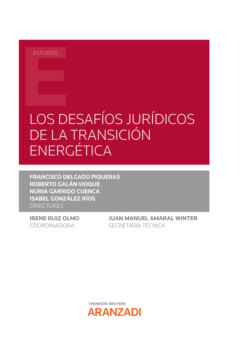Читать книгу Los Desafíos Jurídicos de la Transición Energética - Isabel González Ríos - Страница 22
На сайте Литреса книга снята с продажи.
III. LEGAL FRAMEWORK
ОглавлениеCarrying out an effective energy transition and recovery of the economy, including the energy sector after the COVID-19 pandemic, undoubtedly requires an appropriate strategy and legal framework, both at the European Union and national levels. In terms of energy transformation and broadening the use of renewable energy sources, the key community act, as is well known, is the EU directive RED II - Directive (EU) 2018/2001 of The European Parliament and of The Council of 11 December 2018 on the promotion of the use of energy from renewable sources3, complemented at the end of 2019 by the European Commission Communication - Communication from the Commission to the European Parliament, The European Council, The European Economic and Social Committee of the Regions - The European Green Deal COM/2019/640 final.
According to Article 36 of the RED II Directive, European Union Member States were given time to implement the provisions of the Directive to the national legal order until the end of June 2021. In Poland, however, it was only at the end of May 2021 that the first official draft of amendments to the Act on Renewable Energy Sources appeared, aimed at implementing most of the provisions of the Directive. The draft law has been sent for the public consultations and arrangements between various ministries, so its adoption in Poland will most likely take several more months. The draft itself is an extremely complex piece of legislation and in many places controversial, which will make it much more difficult to proceed smoothly. The prosumer area may be particularly affected, and this does not forecast that the legislative work will be completed before the end of the calendar year, which means at least a six-month delay with respect to the deadline specified in Article 36 of the RED II Directive.
The national document in the area of transformation strategy, on the other hand, is the Energy Policy of Poland until 2040 (EPP 2040), adopted by the government on February 2, 2021. It contains a comprehensive plan within the scope of energy transformation, and its provisions will be detailed and implemented, inter alia, in the adopted legislation. As a result of the EPP 2040 implementation, it is planned to build a fundamentally new energy system in Poland in the next two decades. The proposed actions and investments should take into account the scale of challenges arising from the need to adapt the national economy to EU regulations on achieving climate and energy targets by 2030, the European Green Deal, the COVID-19 pandemic economic recovery plan or striving for climate neutrality, taking into account national capabilities. These actions are undoubtedly to also constitute the Polish contribution to the implementation of the Paris Agreement.
As assumed, the energy transition will be progressive. The first objective is that in 2030 no more than 56% of the raw material used to generate electricity will be coal (in a scenario with high CO2 emission allowance prices, the share of coal may fall even to 37%), and in gross final energy consumption at least 23% will be covered by renewable energy sources. Primary energy consumption in 2030 should decrease by 23% compared to 2007 projections. The above measures should reduce GHG emissions by 30% compared to 1990.
According to the plan, hard coal mines should be gradually phased out by 2049, which will also allow Poland to meet the objectives of the European Green Deal. However, the whole process of withdrawal from coal in the national economy must be conducted in such a way that first of all the country’s permanent energy security is ensured. Moreover, negative social and economic effects that will result from a decrease in the number of employees (job losses) in the mining sector and associated sectors must be limited to minimum. Such action still requires many arrangements with the social side in terms of the appropriate pace of changes, appropriate social protection and rebuilding the structure of the local economies. It concerns especially those parts of the country, where the mining industry is still a significant source of income for many families and a significant factor of economic growth. Currently in Poland works are being conducted on a draft of a social agreement concerning a complete transformation of the hard coal mining sector. One of the proposed solutions is to create a special pro-development fund, the funds from which will be used to strengthen the economic potential of the most affected regions.
All these actions, in a time horizon till 2049, should allow for full implementation of the program assumptions and achieving climate objectives of the EU and Poland by limiting unfavourable environmental changes and negative health hazards for the citizens. The objectives to be achieved under the European Green Deal, i.e. participation in reduction of greenhouse gas emissions by at least 55% by 2030 and achievement of climate neutrality by the European Union by 2050, should not be missed by the Republic of Poland.
